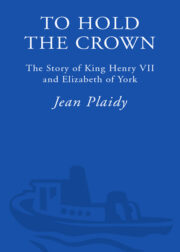The two men had written to each other of escaping from prison. It would not be easy to condemn Warwick to death for that. People would say, for what reason was he in prison? Wasn’t it the most natural thing in the world that he should plan to escape?
That would not do.
He consulted with Lord Oxford who was the High Constable of England. The Constable knew what his wishes were and why. It was imperative that the match with Spain be made without much more delay. If the matter was allowed to drift the Spanish Sovereigns might well betroth their daughter to someone else.
“It would seem,” said the King, “that the Earl of Warwick was not planning merely to escape. His idea was to gather an army about him. That is quite clear.”
It was not. But the Constable knew that the King was commanding him to make it clear.
Henry was right. Oxford saw that. While the Earl lived there would be no peace in the kingdom. At any moment someone would arise and use him as a figurehead. There must be peace. What was the life of a young prince compared with the terrible revenge of war? It was the good of the country against an innocent young man.
“It must be made clear,” said Oxford.
Henry nodded.
The Earl was bewildered to find himself in the midst of so much excitement. Up to now he had spent his days in the quietness of his prison. He knew little of the world. Vaguely he remembered life at Middleham with the Duchess of Gloucester who had afterward become Queen Anne. She had been kind to him—she had been his mother’s sister and she used to talk to him about her childhood when she and Isabel his mother were together at Middleham with Richard whom she married and George whom Isabel had married. “They were brothers,” she had said, “we were sisters . . . daughters of Warwick the Kingmaker who married the sons of the Duke of York.” It had all been very interesting. Then she had died and King Richard had been killed at Bosworth and that was when life changed completely and he became a prisoner in the Tower. For what reason he had never been quite sure. Now he was beginning to understand. It was because his father was the brother of King Edward and King Richard and because King Edward’s two sons had disappeared in the Tower and Richard’s son had died and there was only himself left.
And because of this he had plotted against the King. Had he? He had not known that. He had merely wanted to be free.
The Earl of Oxford visited him. “Yes,” he said, “you wanted to be free so that you could take the crown.”
The young man looked puzzled. “I wanted to be free,” he said.
“You have been here a long time.”
“I came when I was ten years old. I am now twenty-four. More than half my life I have been King Henry’s prisoner.”
“Oh . . . not a prisoner,” said the Earl of Oxford. “You were put here for your protection.”
“Did I need it for so long?”
“The King thought so. And because your father was the Duke of Clarence you thought you had more right to the throne than he had.”
“I had more right to the throne.”
The poor innocent boy. He did not realize that he was signing his own death warrant. It was so easy to trick him . . . this innocent. How could he be otherwise, having spent so many years shut away from the world?
“I have come here to help you,” said the Constable of England. “It would be better for you if you confessed that you know you have more right to the throne than the King and you wanted to depose him.”
“I have more right to the throne. . . .”began the boy.
“Ah, that is what I said. Confess your guilt and the King will doubtless forgive you as he did Perkin Warbeck.”
“Oh, he is free then?”
“He is not free now. I was referring to what happened when he was captured and brought to the King. The King was lenient to him and at first forgave him . . . but he tried to get away and only then did the King put him into the Tower. Confess to your guilt and the King may well be lenient with you.”
The young Earl was persuaded and the Constable went in triumph to the King.
“He should be tried and condemned at once. Warbeck too.”
“They will both be found guilty,” commanded the King. “Warbeck is unimportant. He has been proved to be a fraud. But I have had enough of the ungrateful fellow and he could have a following and one can’t be found guilty and pay the penalty without the other.”
So Perkin and the Earl of Warwick were tried, found guilty of treason, and both condemned to death.
The King did not wish to take revenge on either of these traitors. They were young and foolish, he said; but they had made trouble and for the good of the country this time he intended to act. He had been lenient before; but he had been answered by ingratitude.
Perkin Warbeck should be taken to Tyburn and hanged; the Earl of Warwick should be beheaded on Tower Hill.
In their cells in the Tower the two men awaited the death sentence.


"To Hold the Crown: The Story of King Henry VII and Elizabeth of York" отзывы
Отзывы читателей о книге "To Hold the Crown: The Story of King Henry VII and Elizabeth of York". Читайте комментарии и мнения людей о произведении.
Понравилась книга? Поделитесь впечатлениями - оставьте Ваш отзыв и расскажите о книге "To Hold the Crown: The Story of King Henry VII and Elizabeth of York" друзьям в соцсетях.